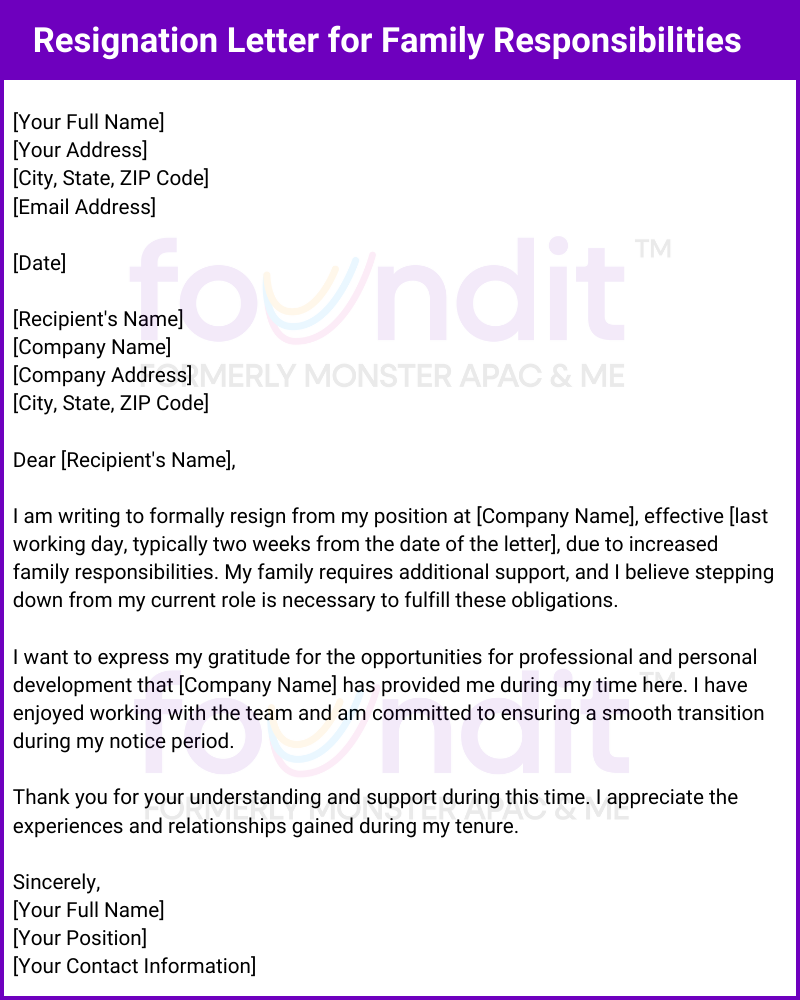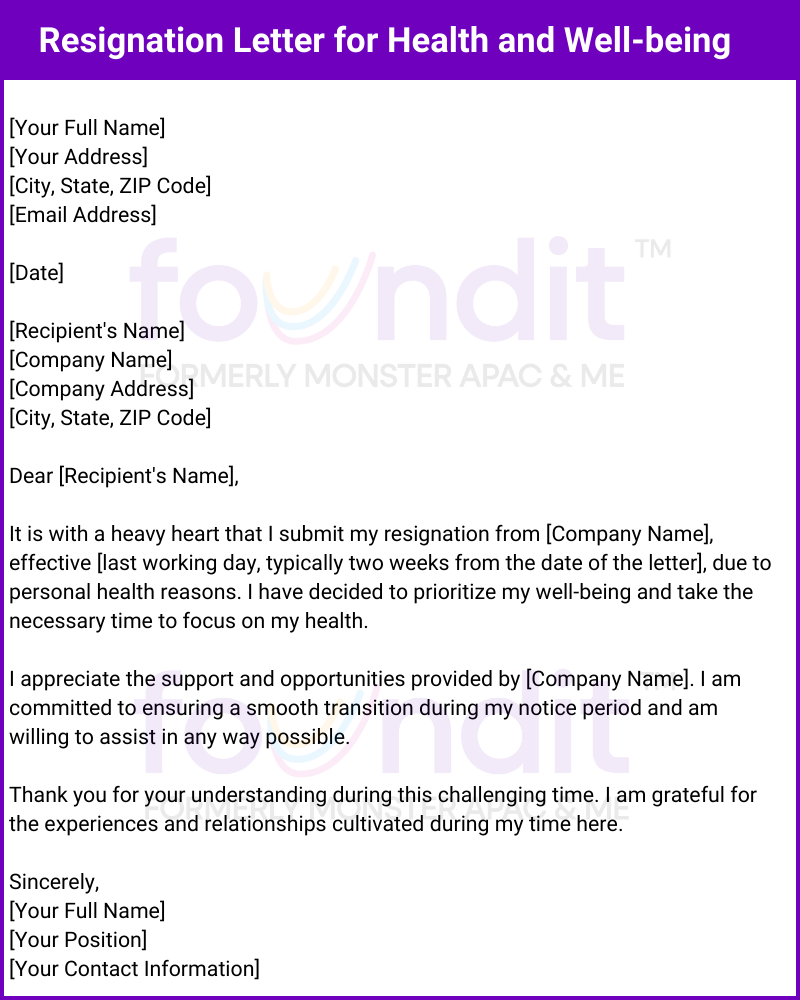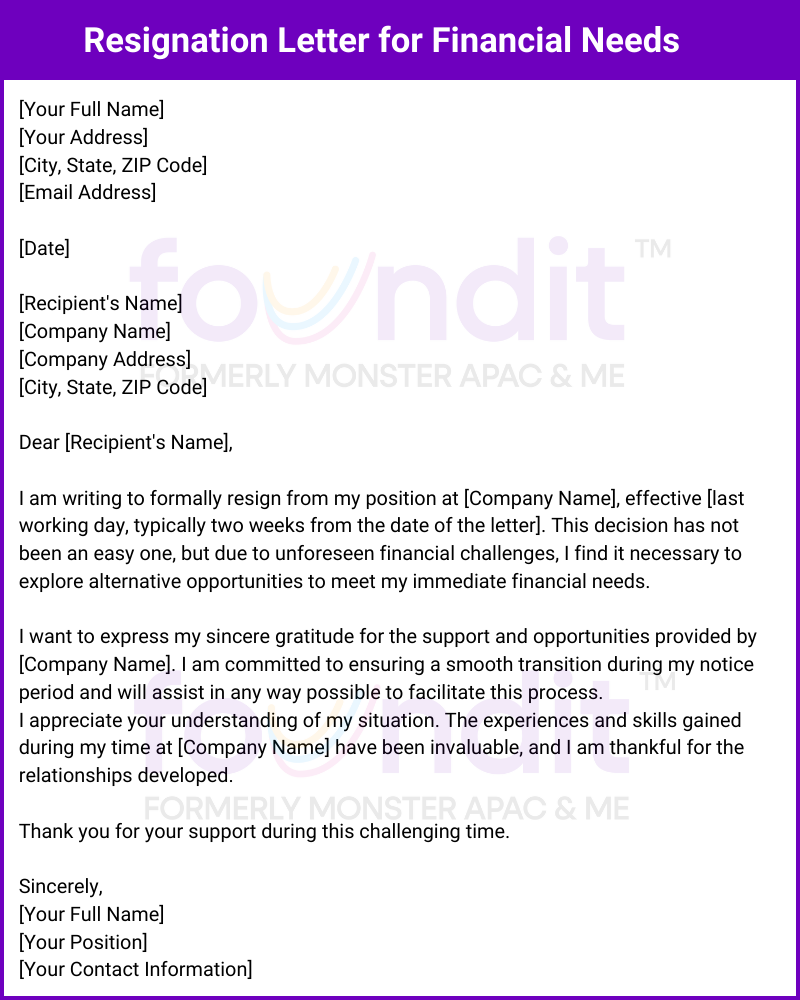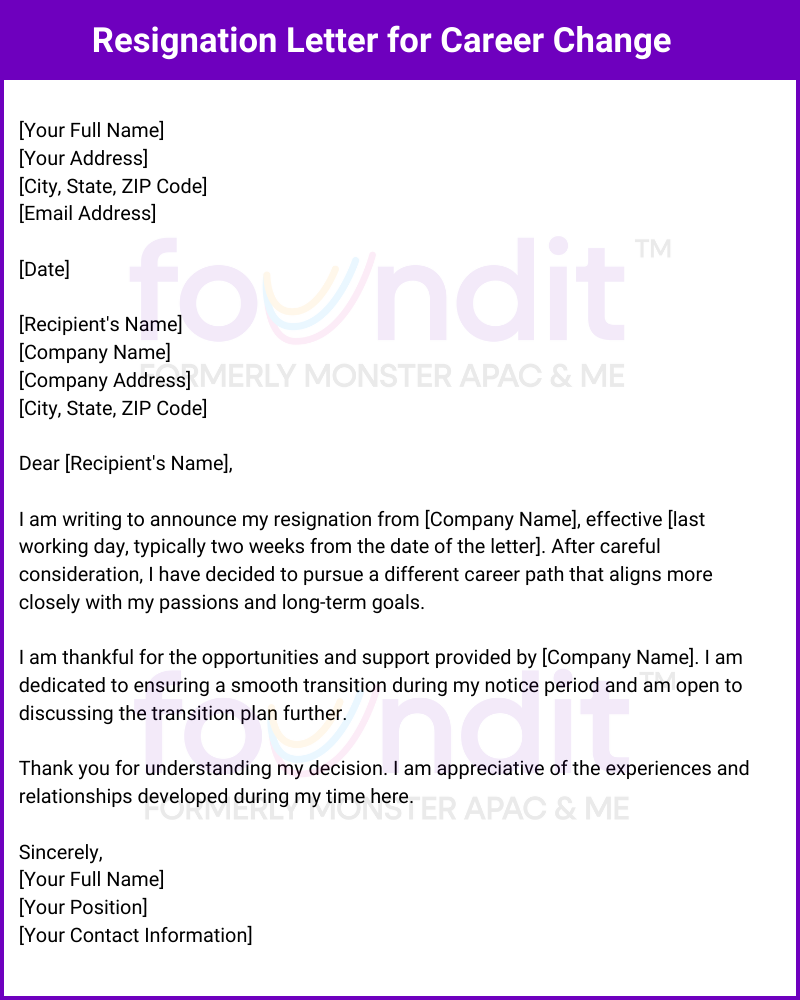When we want things to change, we have to leave something behind. This applies to both our personal and professional lives. If you have decided to leave your job and have already talked to your boss about it, it’s important to handle the situation in a diplomatic way. You should always leave on a positive note and be professional and formal.
This is important because your current employer may be asked about you in future job applications. One formal rule to follow is to write a resignation letter and submit it to your higher-ups at least two weeks before your planned last day of work.
What is a Personal Reason Resignation Letter?
A Personal Reason Resignation Letter is a formal document written by an employee to inform their employer about their decision to resign from their current position due to personal reasons. This letter serves as a professional way to communicate the employee’s intention to leave the job while maintaining a level of privacy regarding the specific personal circumstances.
The format of the personal reason resignation letter typically includes the following key elements:
- Date: The date on which the letter is written.
- Recipient’s Information: The name, title, and address of the employer or supervisor.
- Salutation: A formal greeting addressing the recipient.
- Statement of Resignation: A clear and concise statement indicating the employee’s decision to resign.
- Effective Date: The date on which the resignation becomes effective. Usually, employees provide a notice period, which is typically two weeks.
- Reason for Resignation: A brief and general mention of the personal reasons for resigning without divulging too many personal details.
- Expression of Gratitude: A statement expressing gratitude for the opportunities and experiences gained during the tenure with the company.
- Offer of Assistance: An offer to assist in the transition process during the notice period, such as training a replacement or completing pending tasks.
- Closing: A formal closing statement expressing well wishes for the company’s continued success.
- Signature: The employee’s handwritten signature, if the letter is in hard copy. In an email, the typed name may suffice.
How to Write a Resignation Letter for Personal Reason?
Writing an effective resignation letter for personal reasons involves a thoughtful and professional approach. Here’s a concise guide on the process:

- Begin with a Polite Salutation: Address your employer or supervisor with a formal greeting.
- State the Decision Clearly: Clearly mention your decision to resign due to personal reasons. Keep it brief and avoid delving into excessive details.
- Provide an Effective Date: Specify the last working day, typically offering a notice period of two weeks. This helps in a smooth transition.
- Be Concise About the Reason: While it’s a personal reason, maintain professionalism. You don’t need to disclose sensitive details. A general explanation is sufficient.
- Express Gratitude: Acknowledge the opportunities and experiences gained during your time with the company. Show appreciation for the support received.
- Offer Assistance in Transition: Express willingness to assist in the transition, whether it’s training a replacement or completing pending tasks during the notice period.
- Close on a Positive Note: Reiterate your appreciation, express well wishes for the company’s success, and close the letter professionally.
Remember, the key is to strike a balance between conveying the reason for your departure and maintaining a level of privacy. Keep the tone positive and professional, as this document will become a part of your employment record.
What is the Best Personal Reason for Resignation?
The best personal reason for resignation is one that reflects honesty, integrity, and a genuine need for a change in your professional life. Here are a few examples of acceptable personal reasons for resignation:

Family Relocation
“Due to a family relocation, I have made the decision to resign from my current position. I am grateful for the opportunities here and appreciate your understanding.”
Health Concerns
“Regrettably, I am resigning due to health reasons that require my full attention. I have valued my time here and am thankful for the support I’ve received.”
Educational Pursuits
“I have decided to pursue further education, and as a result, I am resigning from my current role. I appreciate the support I’ve received from the team.”
Personal Development
“In the interest of personal development, I have decided to explore new opportunities. I am grateful for the experiences and growth I’ve had with the company.”
Career Change
“I have decided to make a career change that aligns better with my long-term goals. I am thankful for the experiences and relationships formed during my time here.”
It is crucial to communicate your reason for resignation professionally and respectfully in your resignation letter and during any discussions with your employer. Transparency and honesty, within appropriate bounds, help maintain positive relationships and leave the door open for potential future collaborations.
Types of Personal Reasons for Resignation
There are several personal reasons why you may want to consider resigning from your job. Some of them are:
- Finding a new job
- Personal or family illness
- Difficult work environment
- Relocation
- Going back to school
- Work schedule has changed
- Career change
- You dislike your job
All these types of different personal reason letters vary according to your reason. Below mentioned are a few common personal reasons for resignation.
1. Family issues
Family is important. We can go a thousand miles to help and support them if given an opportunity. Families can be complex and can be the cause of unexpected situations in life. These may be in the form of family members falling ill, serious conflicts.
This reason is more understandable as home life goes hand in hand with work life. Here is one example of how to use this reason in your resignation letter
“I would like to resign because of a current family issue at home where I have to devote all of my time.”
2. Mental health challenges
With changing times and increasing awareness, mental health is not being looked down on. It is becoming less of a stigma, and people focus on it as much as on their physical health. People don’t hesitate to seek professional help if they need to.
This reason on your resignation letter will be authentic and acceptable. Sometimes the monotony of life sets in, or it could be the job stress or stress due to any other reason, but if you find yourself in limbo or a downward spiral, this is a sincere reason to quit your position.
“I would like to resign due to a recent personal and mental health issue and treatment.”
3. Seeking a new career change.
For some people, they need constant change. Burnout happens, and there comes the point in your job when you start to question did you want to do this in the first place? Do you even enjoy doing it? Are you happy with this job? Often the answer to all these questions is a big NO.
And when the answer is a no, you want to start afresh. This is a good reason to use if you find yourself in a mire. A possible line that displays this reason well could be
“I would like to resign to get a fresh start in alignment with my current life goals.”
4. Financial needs
With time, as the family grows and the needs grow, the money that our employer is offering is not enough. We feel underpaid in certain circumstances.
Money is essential, and it’s as simple as that. This reason may come across as shallow, but it is an acceptable reason given the consumerist stimuli we live in. One example of using this reason is as follows:
“I would like to resign because of a financial family emergency.”
5. Misalignment with company values
Change is the only constant. Time changes, people change, societies change, and so does a company. They also change their values and shift priorities, just like people.
If you don’t find yourself aligned with these shifting priorities and changing values, you can put it down in your letter of resignation.
“I would like to resign from my position for personal reasons. I would like to take this chance to redefine my morals and values.”
5 Resignation Letter Samples for Personal Reasons
Here are five resignation letter samples, each detailing a different personal reason for resignation:
Personal Reason Resignation Letter Sample 1: Family Responsibilities

Personal Reason Resignation Letter Sample 2: Health and Well-being

Personal Reason Resignation Letter Sample 3: Pursuing Further Education

Personal Reason Resignation Letter Sample 4: Financial Needs

Personal Reason Resignation Letter Sample 5: Career Change

What to Avoid Writing in your Resignation Letter?
Now that we have understood and learned what all to include in a personal reason resignation letter in order to appear professional, here are a few things that you must avoid writing in your resignation letter.
- If you have become disgruntled and you have started to detest your current job, it’s tempting to give a long list of reasons stating why you are so desperate to leave.
- You should not suggest in your resignation letter that you are holding grudges against your boss or the company by giving a number of reasons why you hate your job. Be mindful to stay positive while crafting your resignation letter.
- Don’t badmouth your boss or peers in any case. Even if he/they is/are the reason you are resigning, you should not spill your feeling on an official letter.
Related: Notice Period For Resignation
FAQs on Personal Reason Resignation Letter Samples
Q1: What should I include in a resignation letter for personal reasons?
A1: In your resignation letter, include a polite salutation, a clear statement of resignation due to personal reasons, an effective date for your departure, a concise explanation of the personal reason without divulging too much detail, expressions of gratitude, and an offer to assist in the transition.
Q2: Is it necessary to mention the specific personal reason in the resignation letter?
A2: While it’s not mandatory, providing a general reason helps convey your situation. However, you are not obligated to disclose sensitive personal details. Maintain a professional tone and focus on expressing your decision to resign.
Q3: How much notice should I give when resigning for personal reasons?
A3: The standard notice period is two weeks. However, depending on your position and the nature of your work, you may discuss with your employer if a longer notice period is feasible or if a different arrangement is needed.
Q4: Should I discuss my personal reasons with colleagues before submitting the resignation letter?
A4: It’s not necessary to discuss personal reasons with colleagues before submitting the letter. Your resignation letter should be the first official communication. If you choose to share details, do so selectively and in a professional manner.
Q5: How do I maintain a positive tone in a resignation letter for personal reasons?
A5: Focus on expressing gratitude for the opportunities and experiences gained during your tenure. Emphasize the positive aspects of your time with the company, and express your commitment to ensuring a smooth transition. Avoid dwelling on negative aspects and maintain professionalism throughout.
| Related Topics | |
|---|---|
| Sample Cover Letters for an Internship | CV Cover Letter Examples |
| Best Resignation Letter Examples | 5 Best Resume Format with Cover Letter |




